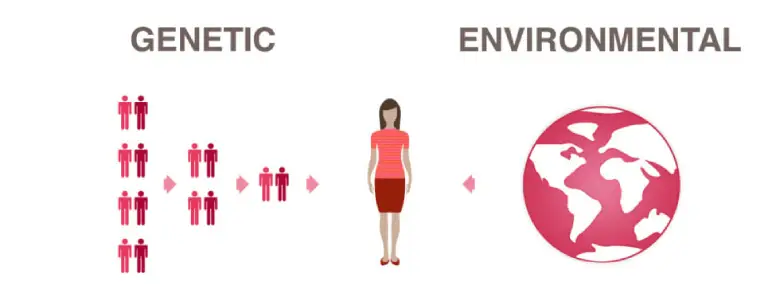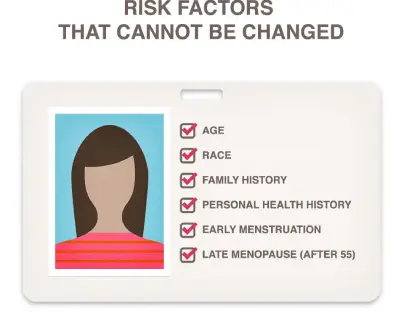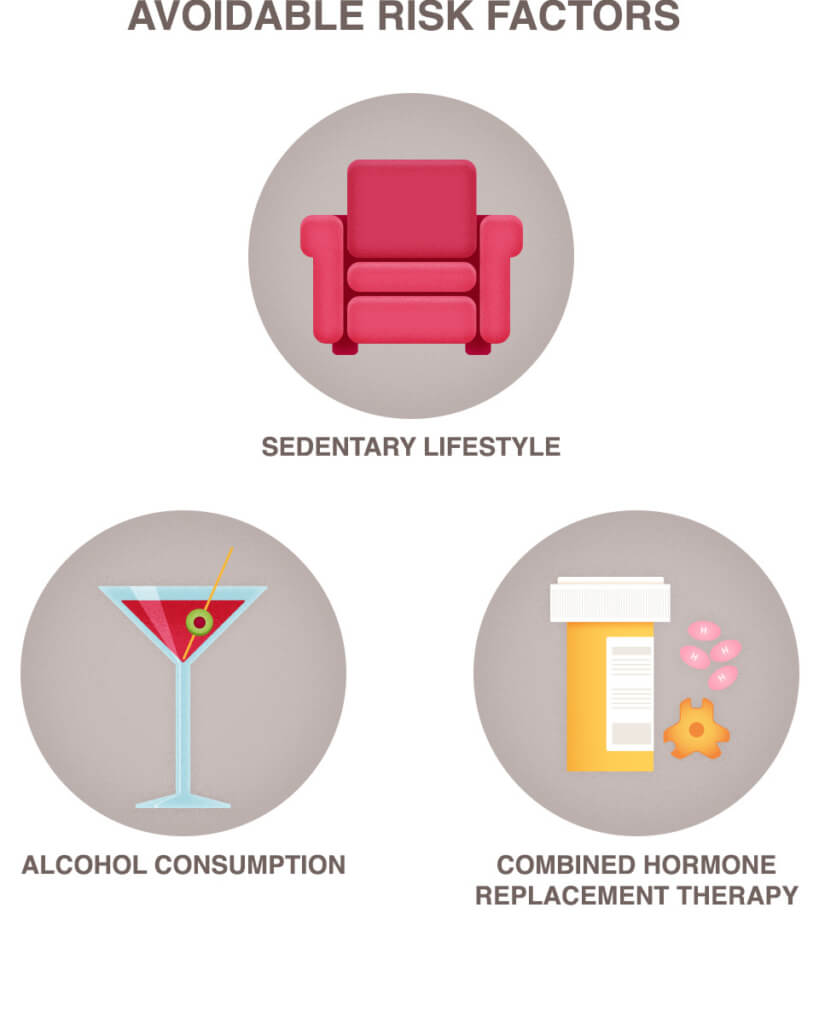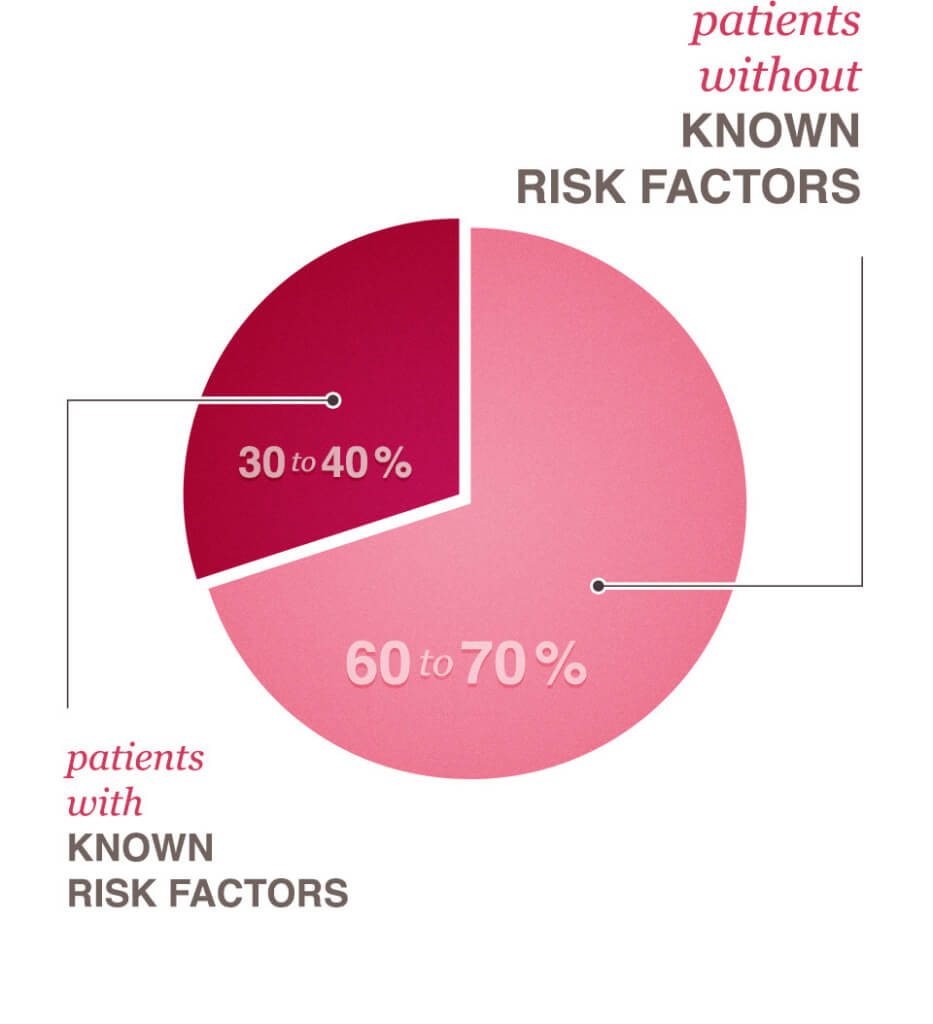Risk Factors
What do scientists actually know about the cause of breast cancer?

Cancer grows when a cell’s DNA is damaged, but why or how that DNA becomes damaged is still unknown. The damage could be caused by genetic or environmental and lifestyle factors, or in most cases, a combination of the two. Most patients will never know exactly what caused their cancer. However, there are certain established risk factors that are associated with breast cancer.
Genetic risk factors are inherited, or passed down, from parent to child through the genes on both the mother’s and father’s side. These risk factors cannot be changed because they are built into your DNA from birth. Environmental and lifestyle risk factors are avoidable risk factors that are typically under an individual’s control. These risk factors can be reduced by changing elements within your environment or making alterations to your lifestyle.
Genetic risk factors
Genetic risk factors that cannot be changed may include:
- Gender: Breast cancer occurs nearly 100 times more often in women than in men.
- Age: Two out of three women with invasive cancer are diagnosed after age 55.
- Race: Breast cancer is diagnosed more often in Caucasian women than women of other races.

- Family history and genetic factors: If your mother, sister, father, or child has been diagnosed with breast or ovarian cancer, you have a higher risk of being diagnosed with breast cancer in the future. Your risk increases if your relative was diagnosed before the age of 50.
- Personal health history: If you have been diagnosed with breast cancer in one breast, you have an increased risk of being diagnosed with breast cancer in the other breast in the future. Also, your risk increases if abnormal breast cells have been detected before (such as atypical hyperplasia, lobular carcinoma in situ (LCIS), or ductal carcinoma in situ (DCIS)).
- Menstrual and reproductive history: Early menstruation (before age 12), late menopause (after age 55), having your first child at an older age, or never having given birth can increase your risk for breast cancer.
- Certain genome changes: Mutations in certain genes, such as BRCA1 and BRCA2, can increase your risk for breast cancer. This is determined through a genetic test, which you may consider undergoing if you have a family history of breast cancer. Individuals with these gene mutations can pass the gene mutation onto their children.
- Dense breast tissue: Having dense breast tissue can increase your risk for breast cancer and make lumps harder to detect. Several states have passed laws requiring physicians to disclose to women if their mammogram indicates that they have dense breasts, so that they are aware of this risk. Be sure to ask your physician if you have dense breasts and what the implications of having dense breasts are.
Environmental and lifestyle risk factors
Environmental and lifestyle risk factors that can be changed may include:
- Lack of physical activity: A sedentary lifestyle with little physical activity can increase your risk for breast cancer. Moving your body or exercising for even 20 minutes a day can help lower this risk factor.
- Poor diet: A diet high in saturated fat and lacking fruits and vegetables can increase your risk for breast cancer. Eating 3.5 to 5 cups of fruits and vegetables a day can help lower this risk factor.

- Being overweight or obese: Being overweight or obese can increase your risk for breast cancer. This risk increases if you have already gone through menopause.
- Drinking alcohol: Frequent consumption of alcohol can increase your risk for breast cancer. The more alcohol you consume, the greater the risk.
- Radiation to the chest: Having radiation therapy to the chest before the age of 30 can increase your risk for breast cancer. While radiation is often an unavoidable therapy for certain illnesses, it is still considered an environmental or lifestyle risk factor because it is not an inherited trait that someone is born with.
- Combined hormone replacement therapy (HRT): Taking combined hormone replacement therapy, as sometimes prescribed for menopause, can increase your risk for breast cancer and increase the risk that the cancer will be detected at a more advanced stage. Speak with your doctor about the benefits and risks of HRT.
Healthy Living & Personal Risk Guide
While you can’t prevent cancer, it is important to be proactive about your health. Get our free guide to help you protect your overall health and assess your breast cancer risk.
Get the Free GuideThe National Cancer Institute (NCI) offers a free online breast cancer risk assessment tool. This tool uses a woman’s personal and family medical history to calculate her risk of developing invasive breast cancer. Click here to use NCI’s Breast Cancer Risk Assessment Tool: Online Calculator*.
*Please note that this assessment tool is not able to take into account every detail of a woman’s medical history, such as a previous history of breast cancer or a BRCA gene mutation. It also cannot actually predict whether a person will or will not get breast cancer. Always talk with your doctor about your risk of developing breast cancer or any new or worsening symptoms you may be experiencing.
What are the stats?
Approximately 60-70% of people with breast cancer have no connection to these risk factors at all, and other people with risk factors will never develop cancer.

These do not cause breast cancer
- Breast cancer is not contagious; you can’t contract cancer from a person who has the disease.
- Breast cancer is not caused by wearing underwire bras, implants, deodorants, antiperspirants, mammograms, caffeine, plastic food serving items, microwaves, or cell phones, as breast cancer myths often suggest.
Sources:
Centers for Disease Control & Prevention



